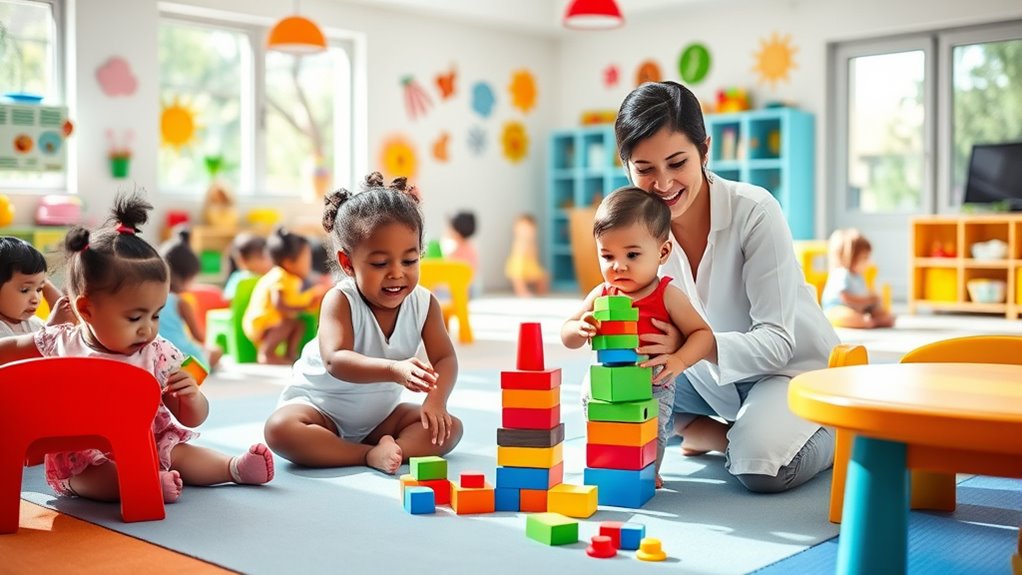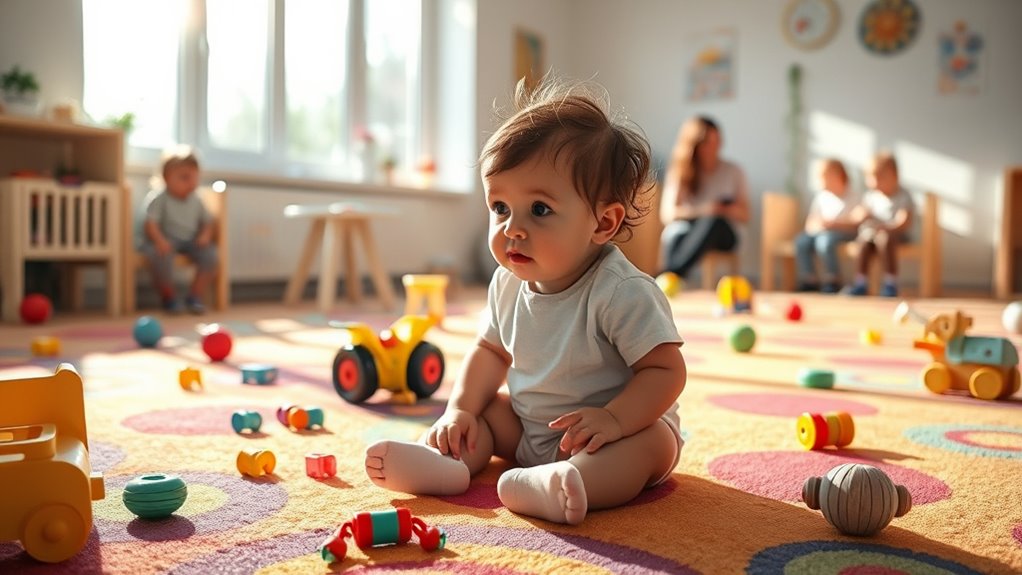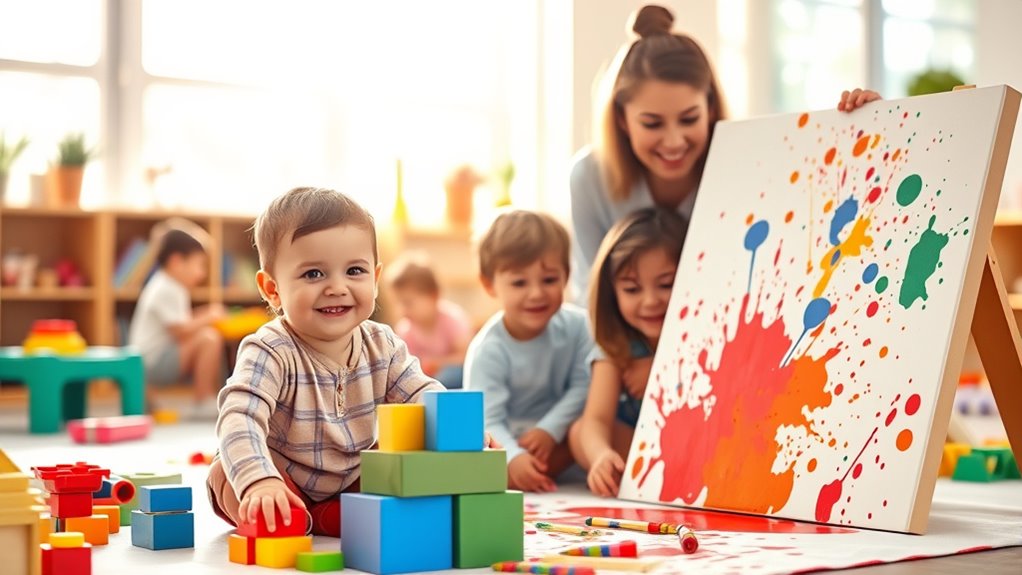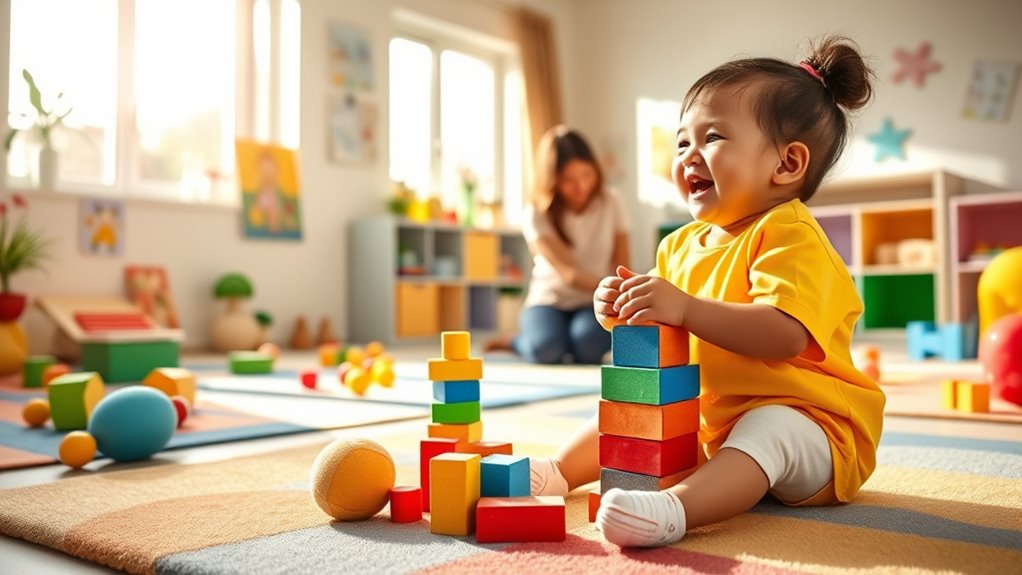Starting daycare at the right age can shape your child's emotional and cognitive growth in profound ways. Enrolling your child between 6-12 months or around two years can foster social skills and independence while reducing behavioral challenges. High-quality daycare offers nurturing environments that boost language development and emotional regulation. It's essential to assess your child's readiness and choose a supportive setting. Keep exploring to uncover insights on making the best daycare choice for your family!
Key Takeaways
- Starting daycare before six months may increase behavioral problems and heighten separation anxiety in infants.
- Enrolling children around 6-12 months supports social skills and cognitive development through structured activities.
- High-quality daycare enhances emotional regulation, language skills, and cognitive abilities, fostering better outcomes by age five.
- Delaying enrollment until 18-24 months can ease adaptation with increased independence and curiosity in children.
- A nurturing daycare environment with low child-to-adult ratios promotes individualized attention and better overall child development.
Understanding the Importance of Daycare Age

When considering daycare for your child, the age at which they start can play an essential role in their development. Research shows that starting daycare before six months may increase the risk of behavioral problems due to potential separation anxiety and insufficient bonding time. Additionally, early detection of any developmental issues can be crucial for intervention. Moreover, engaging children with protein-rich breakfasts can enhance their alertness and focus throughout the day. Newborns typically sleep 14-17 hours a day, which is vital for their overall health and development. Emotional and psychological growth occurs in stages, and understanding this can help parents choose the right time for daycare.
Ideally, children should enter daycare between six to twelve months, as they're more adaptable and can develop social skills through structured interactions. At eighteen to twenty-four months, kids often show improved communication and curiosity, enhancing their social interactions.
High-quality daycare programs greatly support cognitive development, helping children meet important developmental milestones. Ultimately, parents need to prioritize secure attachments and choose quality daycare to foster emotional and cognitive development effectively. Additionally, ensuring that children experience structured interactions in their early years can significantly influence their socialization skills.
The Ideal Ages to Start Daycare

Choosing the right age for your child to start daycare can greatly impact their development. Here are some ideal ages to evaluate:
- 6-12 Months: At this age, children benefit from structured activities that enhance social skills and cognitive development, while educational toys can further stimulate their learning through play. Starting daycare during this period can also introduce them to social interactions, which are crucial for their emotional growth. Additionally, engaging in activities that promote gut microbiota can support their overall digestive health during this formative stage. Early exposure to a variety of experiences can also help build resilience in children, enabling them to adapt better to future challenges.
- 18-24 Months: Children become more independent and curious, making it easier for them to adapt to daycare environments.
- Around 1 Year: Research shows that starting daycare at this age can lead to better language skills and cognitive achievement by age five.
- Post 2 Years: Delaying entry may help reduce social and emotional challenges, as children are better prepared for separation. Additionally, establishing a bedtime routine can further support their transition into daycare by promoting better sleep habits.
The Challenges of Starting Daycare Too Early

Starting daycare too early can pose significant challenges for both you and your child. When infants enter daycare before 4-5 months, they often face heightened separation anxiety, struggling to be apart from you during this critical developmental stage.
Their immune systems are still developing, which makes them more susceptible to illnesses in a group setting. Research shows that children who start daycare before 9 months may experience more behavioral problems later on.
Additionally, infants need personalized care during those early months; they thrive on consistent, individualized attention that's hard to provide in a daycare with multiple children.
Delaying enrollment until after the first year fosters stronger emotional bonding, essential for healthy attachment and overall emotional security.
Key Factors to Consider for Daycare Enrollment

As you consider daycare enrollment, several key factors can shape your decision and your child's experience. Balancing your child's readiness with your family's needs is essential. Here are four key factors to keep in mind:
- Child's Readiness: Assess your child's comfort in new environments and their emerging social skills.
- Developmental Needs: Consider if structured interactions will support your child's emotional and cognitive development.
- High-Quality Daycare: Look for programs that offer nurturing environments with low child-to-adult ratios for individualized attention.
- Parental Work Schedules: Align daycare enrollment with your work commitments to guarantee a smooth shift.
Benefits of High-Quality Daycare for Child Development

High-quality daycare serves as an important stepping stone in a child's early development, offering numerous benefits that extend far beyond mere supervision.
When you choose a quality daycare program, your child gains crucial social skills, language skills, and cognitive abilities in a stimulating environment. Research shows that children in these settings tend to develop better emotional regulation and social competence, greatly reducing the risk of behavioral issues.
Starting daycare around one year old enhances language skills, while structured learning can lead to stronger reading and math abilities by age five.
Tips for a Smooth Transition to Daycare

Choosing high-quality daycare is just the beginning of your child's journey into early education and socialization. A smooth changeover can ease emotional challenges like separation anxiety. Here are some tips to help:
- Gradual Introductions: Take short visits to the daycare, allowing your child to explore while you're present.
- Consistent Routine: Establish a drop-off and pick-up routine to create security and predictability.
- Comfort Items: Provide a favorite toy or blanket to help your child feel relaxed in the new environment.
- Open Communication: Talk to daycare staff about your child's needs and preferences to foster a supportive atmosphere.
Your calm demeanor during drop-off can greatly influence your child's feelings, making them feel more at ease.
Making the Right Daycare Choice for Your Family

When it comes to making the right daycare choice for your family, evaluating your child's readiness is essential.
You'll want to review different daycare options to find one that aligns with their developmental needs and your family's values.
A thoughtful approach can set the stage for a positive experience in daycare.
Assessing Child's Readiness
As you consider enrolling your child in daycare, it's essential to evaluate their readiness to guarantee a smooth changeover. Here are four key factors to assess:
- Social Development: Is your child comfortable with separation from caregivers and able to interact with peers?
- Emotional Readiness: Can they express their feelings and cope with new situations?
- Physical Milestones: Are they sitting up and napping independently?
- Health Considerations: Are their vaccinations up to date, and do they've any significant health issues?
Also, consider your family dynamics and work commitments.
Aligning daycare enrollment with your child's individual needs will help secure a positive experience for everyone involved.
Evaluating Daycare Options
Finding the right daycare for your child can feel overwhelming, but focusing on a few key factors can simplify the process.
First, consider your child's developmental needs; daycare programs provide structured interactions essential for early social development. Look for daycare centers that specialize in care for your child's age group, ensuring they receive appropriate learning experiences.
Quality childcare often features low child-to-adult ratios, fostering emotional and cognitive growth through individualized attention. Additionally, observe how well the center promotes social interaction among children.
Finally, prioritize regular communication with staff to stay updated on your child's progress. By evaluating these aspects, you'll make a more informed decision that supports your child's growth and happiness.
Frequently Asked Questions
What Age Is the Best Age to Start Daycare?
When considering the best age to start daycare, think about your child's developmental stage.
Starting around 6-12 months can boost social development, while ages 18-24 months are great for fostering communication and independence.
Experts warn against beginning before 9 months due to possible behavior issues.
Ultimately, the right timing can enhance your child's emotional security and social skills, so weigh your options carefully to guarantee a positive experience for them.
What's the Best Age to Start Childcare?
The best age to start childcare often sparks debate, but research suggests that beginning between 6 to 12 months is ideal.
At this age, your child can thrive socially, learning to cope with brief separations while engaging with peers.
By 18-24 months, their growing independence makes them ready to explore and communicate more.
Starting too early may lead to anxiety, so timing matters for your child's emotional and developmental well-being.
Are Kids Who Go to Daycare More Successful?
Yes, kids who go to daycare often show greater success in various areas.
Research indicates that quality preschool programs enhance cognitive development, leading to better academic outcomes later on. They also help kids develop essential social skills, reducing peer-related issues.
What Age to Put a Child in Childcare?
When deciding what age to put your child in childcare, consider their developmental readiness and your family's needs.
Research suggests enrolling them between 6-12 months can support social development while maintaining strong bonds with you. If they're between 18-24 months, they'll likely benefit from structured interactions that boost independence.
Avoid starting before 4-5 months due to potential anxiety and health concerns.
Ultimately, high-quality care makes a significant difference in their growth.
Conclusion
In summary, starting daycare at the right age can shape your child's development, boost their social skills, and ease your shift back to work. By considering key factors and recognizing the benefits of high-quality care, you're setting your child up for success. Remember, finding the right daycare isn't just about convenience; it's about nurturing growth, fostering friendships, and creating a supportive environment. Trust your instincts, weigh your options, and make the best choice for your family.









